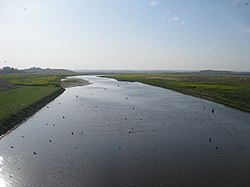Soan River
 | |
| Location | |
|---|---|
| Country | |
| Province | Punjab |
| Physical characteristics | |
| Source | Murree Hills |
| Mouth | Indus river |
• location | Makhad |


The Soan River (Urdu: دریائے سواں; Punjabi: دریائے سواں ), also referred to as the Sawan, or Sohan, is a river in Punjab, Pakistan. It originates from the Murree Hills and joins River Indus near Makhad.[1]
Location and geography[edit]
The Soan River drains much of the water of Pothohar. It starts in the foothills of Patriata in Murree and provides water to the Simly Dam, which is a water reservoir for Islamabad.[2] Near Pharwala Fort, Ling stream, following a relatively long course through Lehtrar and Kahuta, joins the Soan near Sihala on the southern side of Village Gagri.
The Soan river is more than 250 kilometres (160 mi) long. The Islamabad Highway crosses this stream near Sihala at the Kak Pul bridge. The Ling Stream joins the Soan river just before the Kak Pul. Two other streams, the Korang River and the Lai stream, join the Soan just before and after the Soan Bridge, respectively. After following a path along a big curve, the stream reaches the Kalabagh proposed Dam Site close to Pir Piai where it falls into the Indus river.[1]
The marine life of the river are currently endangered due to the discharge of chemicals of the Sihala Industrial State and effluent water of Rawalpindi city into it.[3][better source needed]
Soanians[edit]
The oldest evidence of human activity in Pakistan has been found in the Soan River valley. It was here that some of the earliest signs of pre-modern humans, known as Soanians, have been discovered during the excavations of prehistoric mounds.[4] Some relics found in the Soan Valley area during the excavation process are believed to have originated over 500,000 years ago, during the Stone Age.[3][5]
See also[edit]
References[edit]
- ^ a b Abbasi, Arshad Mehmood; Shah, Munir Hussain; Khan, Mir Ajab (2014-10-15). Wild Edible Vegetables of Lesser Himalayas: Ethnobotanical and Nutraceutical Aspects, Volume 1. Springer. p. 13. ISBN 978-3-319-09543-1.
- ^ "Design & Construction of Simly Dam" (PDF). WAPDA. Retrieved 12 March 2013.
- ^ a b "Ancient Pakistan History - 1". Pakistan Defence. Retrieved 2022-03-16.
- ^ Newspaper, the (2012-03-31). "Soan River — witness to rise and fall of many civilisations". DAWN.COM. Retrieved 2018-11-25.
- ^ Newspaper, the (2012-03-31). "Soan River — witness to rise and fall of many civilisations". DAWN.COM. Retrieved 2023-08-17.
